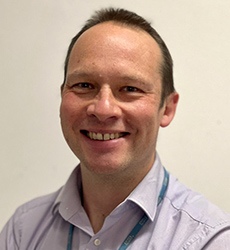Dr Richard Simpson
Which NHS and Academic Institutions do you work for?
I work as Principal Clinical Vascular Scientist in the Department of Vascular Surgery at Nottingham University Hospitals NHS Trust and as Healthcare Science Clinical Academic co-Lead working with the Trust Chief Scientist. I also hold an Honorary Assistant Professor at University of Nottingham, School of Medicine.
What do you like about being a Clinical Academic?
Being a Clinical Academic allows me to combine patient-facing clinical work with the development of research that will improve patients’ future care. My clinical work allows me to provide a diagnostic service for patients from which I can then see the benefit when they received their treatment. The research work gives me the opportunity to investigate and hopefully solve clinical problems I face. Both are satisfying, but in very different ways.
I have recently been appointed Healthcare Science Clinical Academic co-Lead for my NHS Trust and this provides me the opportunity to help encourage other Healthcare Scientists to be research active.
Can you briefly describe how you became and developed as a Clinical Academic?
I developed in interest in research during my Vascular Science training, initially being involved in data collection and patient identification in studies that were hosted in the Vascular Surgery department. To expand my knowledge and experience, I became a member of a NHS Research Ethics Committee and completed a MSc. in research methods. I secured a Stroke Association Junior Research Training Fellowship to under-take a part-time PhD, as part of a larger project with NHS and University colleagues. I continued my clinical work alongside my PhD and supervised MSc. projects undertaken by STP trainees.
Since my PhD, I have continued to develop my research network and this enabled me to continue working with existing research teams and to develop new ones.
As Chair of the Society for Vascular Technology Research Committee, I am responsible for helping to develop the research activity of Vascular Scientists nationally.
Give one example of where your work has changed practice?
Early in my research career I was involved in a study that compared treatment options for venous disease. This led to one of them being adopted by our Trust and was associated with improved patient outcomes and satisfaction.
What advice would you give to a Healthcare Scientist who is an aspiring Clinical Academic?
Get involved! The obvious place to start is to get involved in research in your department, but cast your net wider and speak to researchers in other departments and organisations. Start with data collection and small audits, but then move onto small research projects and beyond.
Persevere! It can be a challenge to negotiate the two different aspects of a Clinical Academic, but it is very rewarding. Clinical and academic mentors and networks can help in enabling the combination of the two roles. It is important to discuss your aspirations with your manager; hopefully they will be able to support you.
There is also lots of information available to help you in the journey, such as the local R&D, NIHR, HEE and NSHCS, professional bodies, AHCS etc.
